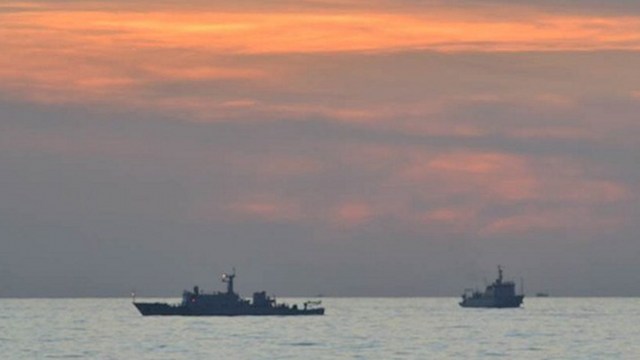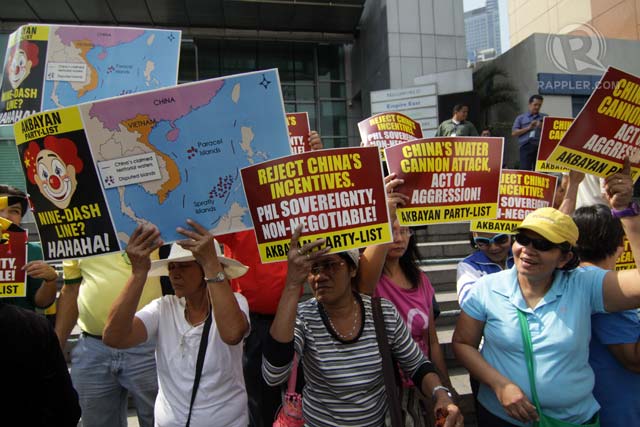SUMMARY
This is AI generated summarization, which may have errors. For context, always refer to the full article.

MANILA, Philippines – In the first place, should the arbitral tribunal hear the historic case?
Before anything else, the Philippines needs to clear this major hurdle – a question on jurisdiction – in its case against China over the West Philippine Sea (South China Sea).
To attack the case, Chinese analysts argue that the arbitral tribunal lacks jurisdiction.
In a recent forum, Philippine Solicitor General Francis Jardeleza said the tribunal will rule on jurisdiction “together with the merits,” or the meat of its arguments.
Since China is unlikely to participate and prolong the case, the Philippines expects the ruling by 2015.
“We hope to win on both, that we have jurisdiction and they will approve all of our claims,” Jardeleza said.
The Philippines is set to submit its memorial, or written pleading in the case, by March 30.
Sources told Rappler that China offered incentives to stop the Philippines from doing this. Other observers warned that if the Philippines does, China is ready with its “sticks.”
‘Tactically better off’
Jardeleza said the Philippines will discuss both jurisdiction and merits in its memorial.
In other arbitration proceedings, he said, parties “bifurcate” the case. This means they tackle jurisdiction first, then the merits. In these cases, he said the first question is: “Do you or do you not have jurisdiction? Indeed if there is no jurisdiction, there is no need to go into the merits.”
He said the Philippines “proposed to the tribunal that we do it together.” “We are tactically better off having both jurisdiction and merits,” he said.
Jardeleza explained the Philippines chose to do this because the country is “very strong on the merits.”
“If you have a very strong case, you do not talk about jurisdiction. You go to straight to the case,” he said.
“And then,” he added, “if you convince the judges that you’re strong on the merits and our claim is just, then the issue of jurisdiction will be folded in as a win on the merits. That’s the reason why while ordinarily, you go first for a question on jurisdiction, in the particular circumstances of this case, the legal team decided that we propose – and we were allowed – to discuss jurisdiction and the merits at the same time.”
Jardeleza said it ends up cheaper, too, “because then you just spend once on one memorial.” He declined to reveal the cost.
What China ‘does not accept’

Chinese analysts, on the other hand, reject the tribunal’s jurisdiction by citing a declaration China made on Aug 25, 2006.
In this declaration, China said it “does not accept” arbitral jurisdiction over certain disputes. One of the excluded disputes, which the Chinese often cite, involves sea boundary limitations.
The United Nations Convention on the Law of the Sea (UNCLOS) allows such exclusions.
Philippine Supreme Court Associate Justice Antonio Carpio said disputes on maritime boundary delimitation arise from overlapping exclusive economic zones (EEZs), among others.
The EEZ is an area 200 nautical miles from a country’s baselines, or edges, within which a state has the sovereign rights to explore and exploit, and conserve and manage natural resources, among others.
It has everything to do about the right of Filipino fishermen to fish in the West Philippine Sea. The Philippines claims China is violating this right every time it drives away Filipino fishermen there. (READ: PH protests China’s moves in Ayungin Shoal)
While the EEZ lies at the heart of the Philippines’ argument, Carpio said the arbitral tribunal has jurisdiction over the historic case. China, for one, “has no EEZ that overlaps with the Philippines’ EEZ in the Scarborough area.” (READ: What’s at stake in our case vs China)
He explained: “China’s baselines are either along the coast of Hainan Island, which is 580 NM from Luzon, or along the coast of mainland China, which is 485 NM miles from the Zambales coastline in Luzon facing Scarborough Shoal. Even if you grant the Chinese-held Paracels an EEZ, the Paracels are about 480 NM from Luzon. To have overlapping EEZs, the distance between the opposite baselines must be less than 400 NM. In the Scarborough area, there is no baseline in Luzon where its distance from the nearest Chinese baseline is less than 400 NM.”
Not among China’s exceptions
In its Notification and Statement of Claim, the Philippines raises several points to prove the arbitral tribunal should hear the case.
The Philippines, for one, acknowledged the exceptions that China invoked in 2006.
It said none of the exceptions allowed by UNCLOS, however, “is applicable to the Philippines’ claims in this arbitration.”
The country explained: “It follows that the Philippines’ claims do not fall within China’s Declaration of 25 August 2006, because they do not: concern the interpretation of Articles 15, 74, and 83 relating to sea boundary delimitations; involve historic bays or titles within the meaning of the relevant provisions of the Convention; concern military activities or law enforcement activities; or concern matters over which the Security Council is exercising functions assigned to it by the UN Charter.”
The Philippines’ lawyer in its case against China, Paul Reichler, told Rappler he is confident the Philippines will win by 2015. (READ: PH lawyer on China: Being ‘int’l outlaw’ has its price)
“I will simply say that the entire legal team that has been engaged by the Philippines believes that the Philippines has a strong case, both on jurisdiction and on the merits,” Reichler said. – Rappler.com
Add a comment
How does this make you feel?
There are no comments yet. Add your comment to start the conversation.